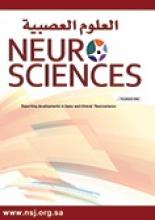Abstract
OBJECTIVE: To study the correlation of randomly-tested total antiepileptic plasma levels and seizure control in a retrospectively collected group of pregnant epileptic Saudi women.
METHODS: The medical records of 30 Saudi epileptic female patients were reviewed during their subsequent pregnancies (total of 50). The type of antiepileptic drugs used during each pregnancy, the dose of each drug and the corresponding total plasma levels were noted. Antiepileptic drugs assay were carried out randomly during pregnancy either by TDX or a sensitive high performance liquid chromatography method.
RESULTS: A total of 50 pregnancies were studied. The most common seizure type in these women was complex partial seizure followed by primary generalized epilepsy, myoclonic seizures and of least occurrence was the simple partial seizure with secondary generalization. All patients were received antiepileptic drugs, including either carbamazepine, phenytoin, valporic acid, phenobarbitone or clonazepam. In a total of 24 pregnancies (48%), the serum levels of antiepileptic drugs were subtherapeutic during the first trimester. Recurrent seizures occurred in a total of 20 pregnancies (40%) especially in the 3rd trimester.
CONCLUSION: It is concluded that subtherapeutic serum levels of antiepileptic drugs correlated highly with the increased frequency of seizure in these pregnant women. Monitoring of state of seizure control in epileptic pregnant women should be made regularly during the course of their pregnancies.
- Copyright: © Neurosciences
Neurosciences is an Open Access journal and articles published are distributed under the terms of the Creative Commons Attribution-NonCommercial License (CC BY-NC). Readers may copy, distribute, and display the work for non-commercial purposes with the proper citation of the original work.






